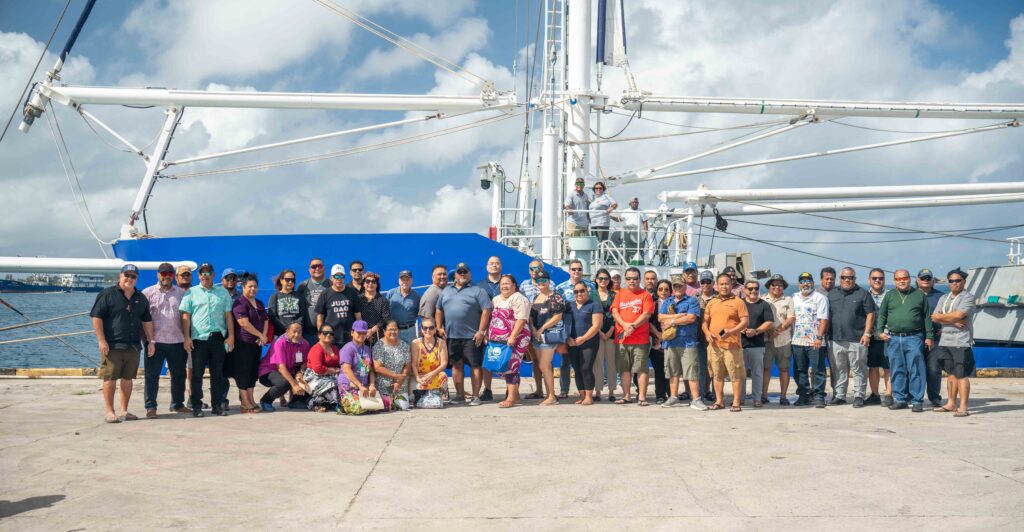
A significant milestone in advancing sustainable maritime transport was achieved during the 64th Board of Directors’ Meeting of the Association of Pacific Island Legislatures (APIL), held from February 24 to 28, 2025, in Majuro, Republic of the Marshall Islands (RMI). Among the key discussions and events, a highlight was the successful demonstration voyage of the SV Juren Ae—a low-carbon sailing vessel constructed in South Korea and now operated in the Marshall Islands. The vessel stands as a symbol of innovation and a tangible step toward greener, more resilient shipping solutions for the Pacific region.
On February 27, a distinguished delegation, including the Speaker of the RMI Parliament, Mr. Branson Wase, embarked on a symbolic sail aboard the SV Juren Ae to Kalalen Pass. This voyage not only demonstrated the vessel’s operational capabilities but also symbolized the Pacific region’s commitment to climate resilience and responsible ocean stewardship. As the sails caught the wind and the vessel glided smoothly across the lagoon—without consuming a single drop of fossil fuel—the message was clear: the Pacific is charting its own course toward sustainable, low-emission maritime transport.
The hands-on sailing experience provided government representatives with a tangible understanding of the potential for modern, climate-friendly technology and its accessibility for Pacific Island nations.
The Juren Ae is more than just a vessel—it represents innovation and serves as a platform for transformative change in Pacific maritime transport. Purpose-built with sustainability, cultural heritage, and modern engineering in mind, the vessel offers a compelling alternative to the conventional, diesel-dependent inter-island transport systems that dominate Pacific waters today. Equipped with an Indosail mechanized rig, the Juren Ae uses wind as its primary propulsion system, reducing CO2 emissions by up to 80% compared to other vessels in the Marshall Islands Shipping Corporation (MISC) fleet. Solar panels and battery storage further enhance its sustainability by providing auxiliary power when wind conditions are insufficient. This hybrid system, which can operate with zero emissions under favorable conditions, offers a cost-effective and environmentally friendly alternative to traditional fuel-powered ships.
The vessel was designed specifically for the conditions of the Pacific Ocean, optimizing its sail system and hull design for maximum efficiency. Extensive hydrodynamic research and the integration of the innovative Wagner keel system have ensured excellent course-keeping and stability, even in challenging weather conditions. The result is a reliable, climate-neutral ship that is capable of carrying a variety of cargo, including food, medicines, fuel drums, and fresh water, while also providing passenger capacity.
The SV Juren Ae’s development was a collaborative effort, involving partners such as Emden-Leer University of Applied Sciences (HEL) and the Marshall Islands Shipping Corporation (MISC), with support from the German Deutsche Gesellschaft für Internationale Zusammenarbeit (GIZ). The vessel was officially delivered to the Marshall Islands in July 2024, marking a major step forward in the Low Carbon Sea Transport project. The goal of this initiative is to help reduce greenhouse gas emissions in the national maritime transport sector while lowering transportation costs.
In the first year of operation, extensive data will be collected to optimize the ship’s propulsion and sail system, contributing to the development of even more efficient, emission-free vessels in the future. As part of a broader regional effort, the project aims to support neighboring countries with the acquisition of low-emission ships and establish partnerships for the development of similar vessels.
Through these efforts, the Pacific region is advancing toward a sustainable maritime future, where innovation, tradition, and climate resilience come together to ensure the continued mobility of island nations while protecting the environment.
The Low Carbon Sea Transport (LCST) Project in the RMI is implemented by GIZ and funded by the German Federal Ministry for Environment, Nature Conservation, Nuclear Safety and Consumer Protection (BMUV).